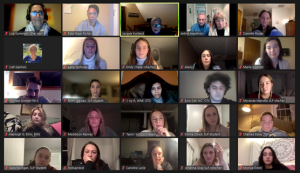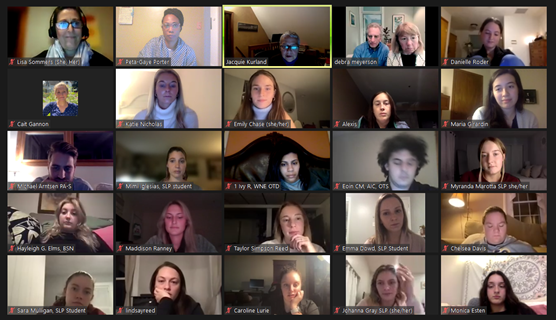Authors: Jessica Bodish, Neaama Bourote, Renee Clark, Maria Girardin, Johanna Gray, and Amelia Iglesias, on behalf of the Graduate SLP Class of 2022, UMass Amherst
On Tuesday, November 2nd, PV-IPEC in coordination with the UMass Amherst Department of Communication Disorders held a memorable virtual interprofessional education (IPE) program on stroke/aphasia. Second year graduate students in Speech-Language Pathology (SLP) at UMass Amherst offer the following insights after facilitating this IPE event with over 100 colleagues from other local universities.
Sharing a room with members of your cohort who have the same passion can be educational. Sharing a room with students from related professional programs, albeit a Zoom breakout room with tiny square boxes, is both educational and empowering. You can be the “expert” in the room and still leave with a notebook of knowledge you hadn’t considered before.
Following a presentation that included the basics of stroke/aphasia etiology, signs and symptoms, and the impact of aphasia on identity, students were placed into breakout rooms to discuss reflective questions, for example on the role of their individual professions with stroke and aphasia, and their experience and comfort level when interacting with a person with aphasia (PWA). Participants were pursuing degrees in occupational therapy (OT), social work, nursing, and physician’s assistant (PA) programs. There was room for inspiring educational discussion, sharing of anecdotes, and advocacy proposals for our future clients with aphasia.
Reflective of the breakout room discussions, many of the SLP students shared the observations about how new the disorder of aphasia was to many of the other allied health profession students. For many of these students, aphasia was a brief topic of their education and this lack of knowledge made it difficult for the students to answer some of the planned aphasia discussion questions. This opportunity proved beneficial to the students to take the time to understand the many varieties of aphasia presentation and the impact of living with aphasia on individual stroke survivors.
Some professionals felt discomfort communicating with people with aphasia, expressing that they believed that they may need to rely on the SLP whenever attempting to communicate with a PWA. Others expressed feeling more comfortable with the idea of using different modalities of communication with patients. Some even mentioned the new barriers that the COVID-19 pandemic has posed regarding communicating with patients through face masks. The care partners are not able to be as present as in the past because of restrictions, so they are not able to help when PWA struggle communicating.
It was eye opening for both the SLP students and those in other healthcare programs to gain a better understanding of one another’s knowledge regarding aphasia. Not only could students in nursing, PA, OT, and social work learn from the SLP students who are trained broadly in language and communication, but it was also beneficial for SLP students to recognize that they should continue to provide interprofessional guidance to their colleagues in their future careers.
The second half of the IPE event was led by the wonderful Debra Meyerson and her husband Steve Zuckerman. As author of Identity Theft: Rediscovering Ourselves After Stroke (Meyerson), and co-founders of Stroke Onward (Meyerson and Zuckerman), their joint mission is to tell the stories of PWA and their journeys of discovering a new identity post-stroke, with a unique focus on the emotional journey that supports stroke and aphasia recovery. Their powerful presentation supplemented our prior discussions perfectly. Debra and her family’s individual story of aphasia’s impact truly solidified the importance of all of our work, while also highlighting that this was only one story of many. Debra conveyed, for example, the importance of talking to individuals with aphasia directly and using the same tone and register as you would with any patient, so that they feel respected and heard. She also emphasized the critically important need to educate psychologists and counselors on treating people with aphasia. There is currently a dearth of mental health specialists who are trained with the skill set needed to competently communicate with aphasic clients as they adjust to their new life post-stroke.
Toward the end of their presentation and Q&A session with the students, Steve shared the exciting news that they were planning a cross-country bike trip from Oregon to Boston in summer 2022 to raise awareness about stroke, aphasia, and the need to fully support the emotional journey in recovery from traumas like stroke. That ambitious plan has crystallized into the Stroke Across America (SAAM) project, and if you are interested in participating at any level of support, you can find more information here. The bikers and their entourage will be arriving in Northampton on Tuesday, August 23rd and staying for a stroke/aphasia awareness event in Amherst on Wednesday, August 24th. If you’d like more information on getting involved in the local event, contact Jacquie Kurland (jacquie@umass.edu).
The main takeaway from the IPE event was that our clinical skills will benefit, as will our future stroke and aphasia clients, when we learn to collaborate on an interprofessional team with our future colleagues. While there may be comfort in sticking to our own separate fields, when we come together, we can create connections with other professionals to become more effective providers. It is helpful to us individually as professionals; more importantly, however, when professionals of different backgrounds come together to share knowledge while promoting patient-centered care, we improve both our individual and collaborative team practices, a win-win for the team and for our clients.
Participating schools: University of Massachusetts Amherst Speech-Language Pathology, Western New England, Springfield College, American International College, Baypath, Elms College, Greenfield Community College
 Healthcare Workforce Partnership
Healthcare Workforce Partnership 

 REB - REGIONAL EMPLOYMENT BOARD OF HAMPDEN COUNTRY, INC.
REB - REGIONAL EMPLOYMENT BOARD OF HAMPDEN COUNTRY, INC.